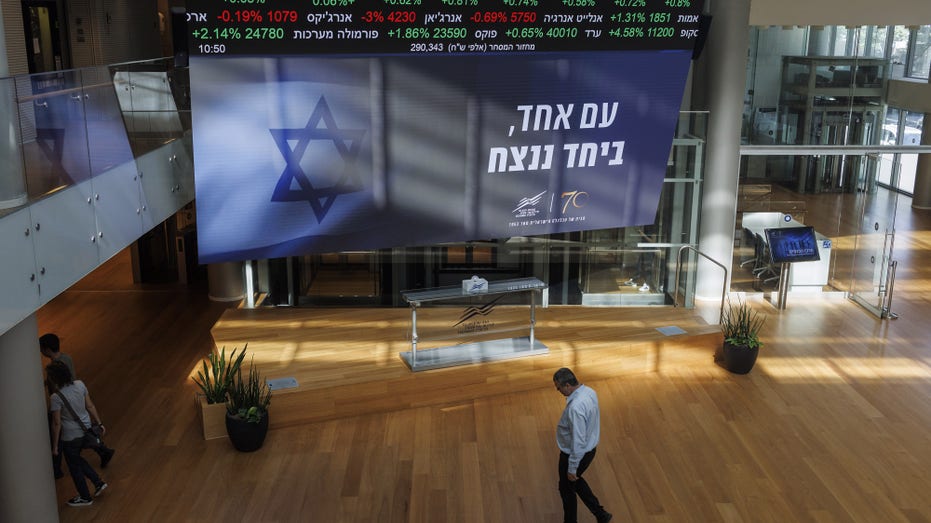Israel’s economy fights to recover as Israel-Hamas war rages on
Country showing recovery signs in first quarter of 2024
Talks of ‘conditioning aid’ to Israel is ‘particularly appalling’
The Lawfare Project founder Brooke Goldstein shares her organization’s ongoing efforts to combat antisemitism in America during her appearance on "The Big Money Show."
JERUSALEM — Israel’s economy is fighting to recover after taking a battering in the final quarter of 2023 after the country was forced into an all-out war with the Iranian-backed Islamist terror group Hamas in the Gaza Strip, according to official data published Monday by Israel’s Central Bureau of Statistics.
According to the report, Israel’s economy shrank by almost 20% in annualized terms due to Hamas’ brutal Oct. 7 attack in southern Israel, which sparked a mass mobilization of Israel’s military, including the call-up of some 300,000 reserve soldiers who had to leave workplaces and businesses in order to serve in the army.
In addition, Israeli government spending increased sharply due to the war, rising some 88% in the final three months of the year as it boosted its military spending and provided alternative accommodations for more than 120,000 Israelis evacuated from their homes in communities along the southern border with Gaza and in the north, where the Shiite terrorist group Hezbollah began firing rockets at Israel from inside Lebanese territory.
EXCLUSIVE: JEWISH EMPLOYEES AT TIKTOK SHARE DETAILS OF HOSTILE, ANTISEMITIC WORK ENVIRONMENT

The Israeli economy endured a tough final quarter of 2023 as a result of its war with the Hamas terrorist group in Gaza. (Kobi Wolf / Bloomberg / File)
The uncertainty and strain of war also caused consumers to pull back on spending, which reportedly dropped by roughly 27% in the final quarter of last year. The war also saw a fall of 42% in imports to Israel of goods and services and a decrease of 18% in exports from the country, the report said. It also noted that Israel’s GDP dropped by an annualized 19.4% compared with the previous quarter, although overall it grew by some 2% in 2023 from 2022.
Dr. Michel Strawczynski, an economist at the Hebrew University of Jerusalem, told Fox Business that while Israel was used to such conflicts and that in previous rounds of fighting its economy had bounced back, the current war was already much longer and more intense than in the past.
However, he said, despite the war showing no signs of stopping, there were some signs the economy was making a comeback.
"So far, we had a very bad quarter in the last quarter of 2023, but, if we look at the numbers in this quarter, the first quarter of 2024, we already see that the economy is recovering," he said, noting that an indication of this was the country’s unemployment figure, which dropped by 1% over the last two months after climbing to 7% in the last quarter of 2023, partly due to the large number of people evacuated from their homes.
"I expect a positive growth in this quarter," said Stawczynski, who previously served as the director of the research department at the Bank of Israel. "But the big question is about the duration of the war, whether it will be long or short; the costs are very much dependent on that."
ISRAEL GRANTS INTEL $3.2B FOR NEW $25B CHIP PLANT, BIGGEST EVER COMPANY INVESTMENT IN COUNTRY

Smoke rises after an Israeli air strike in the Gaza Strip on Oct. 30, 2023. (Tsafrir Abayov / AP Newsroom)
He said several key sectors have been affected by the war, and while some will only recover once the war ends, others will likely bounce back on their own.
Incoming tourism, with most foreign tourists opting to stay away and most international airlines, including U.S. companies, grounding all flights to Israel, has been most hurt by the fighting, said Strawczynski.
"While some of the big airlines, like Lufthansa, have come back to Israel, so far, the American airlines and the low-cost airlines have not," he said.
Sectors likely to recover more quickly, said Strawczynski, include the building and construction industries, which rely heavily on Palestinian laborers from the West Bank who were restricted from entering Israel following the Oct. 7 attack; agriculture, which was also stunted due to a shortage of labor; and Israel’s high-tech sector, which was already suffering before the war due to the aftereffects of the COVID-19 pandemic.

The grounding of most international air travel to Israel has hurt the country's tourism industry. (Nicolas Economou / NurPhoto / File / Getty Images)
He said that new government measures granting entry to foreign laborers will help revive the construction sector; agriculture, which is only 3% of Israel’s economy, did not see a huge impact in macroeconomic terms; and with the IDF now releasing its reserve soldiers, the high-tech sector should begin to rebound.
But the war may have some longer-lasting economic effects. Last month, the rating agency Moody’s lowered Israel’s sovereign rating from A1 to A2 because of concerns over the war. It previously also lowered the country’s debt outlook to negative over fears the war would intensify and spread to the northern front.
"In the short run, this has not had a huge impact yet," noted Strawczynski, who described several initiatives taken by the Israeli government to offset Moody’s decision.
But if the war continues for many more months, he said, Israel’s government will be forced to find income sources from elsewhere, including increasing interest rates and taxes. Another way to offset any future deficit in spending, Strawczynski said, is for Israel to secure a proposed U.S. military aid package worth billions of dollars, which has been stalled in Congress.

An electronic ticker displays stock price information in the foyer of the Tel Aviv Stock Exchange in Israel on Nov. 7, 2023. (Kobi Wolf / Bloomberg / File / Getty Images)
GET FOX BUSINESS ON THE GO BY CLICKING HERE
Israeli leaders have brushed off the idea that the war will cause any long-term damage to Israel’s economy, saying that it is used to conflicts and has been resilient in the past.
Following the Moody’s announcement on Feb. 10, Prime Minister Benjamin Netanyahu said the decision was not connected to the state of the economy but "due to the fact that we are in a war."
"The rating will go back up the moment we win the war, and we will win the war," he said.




















